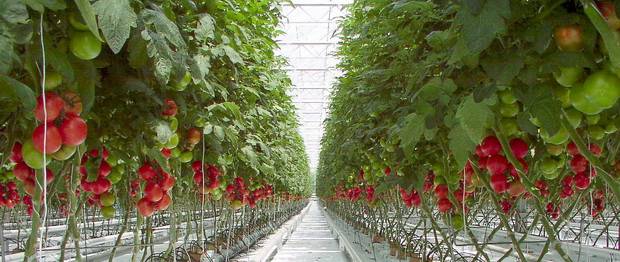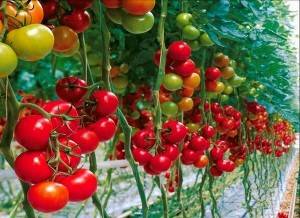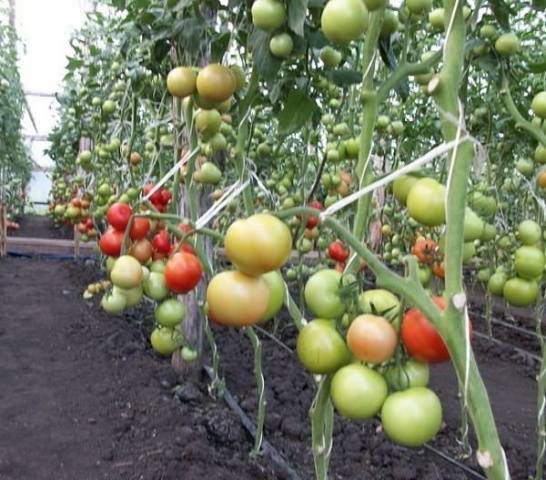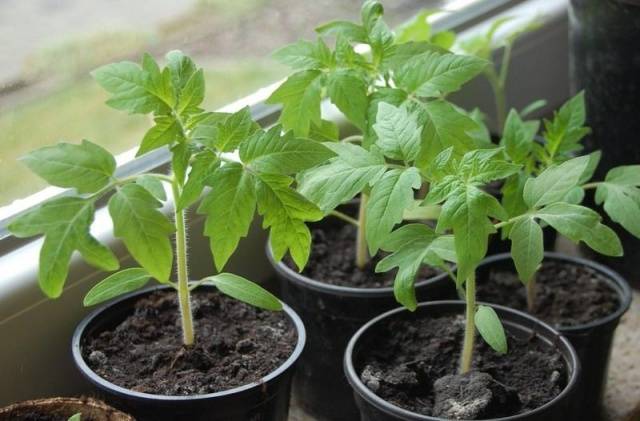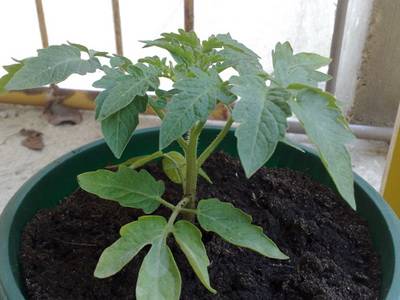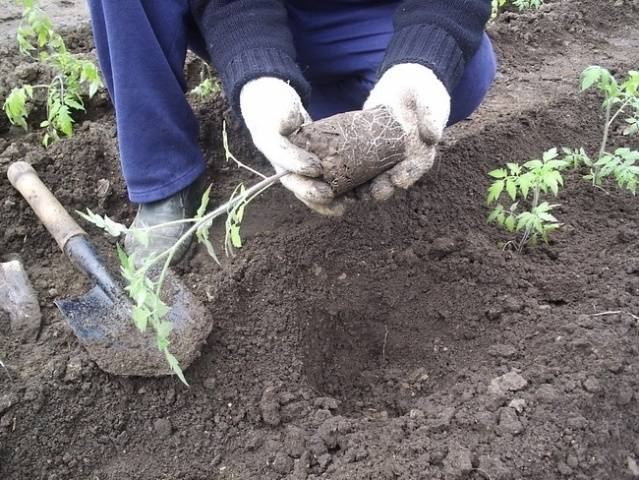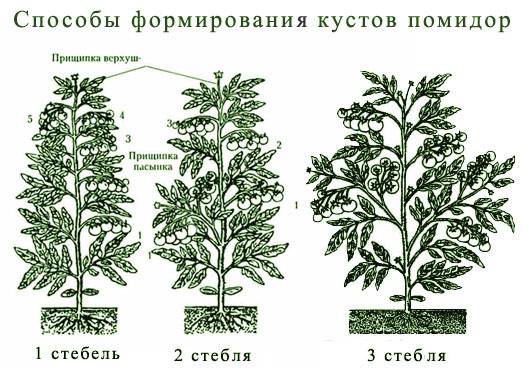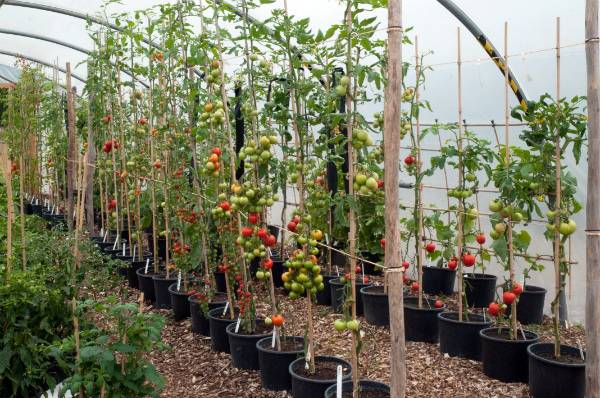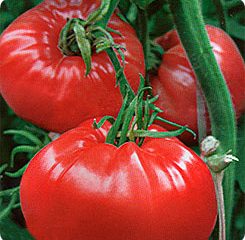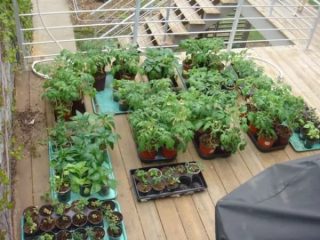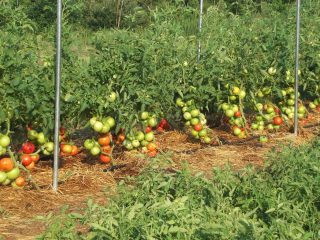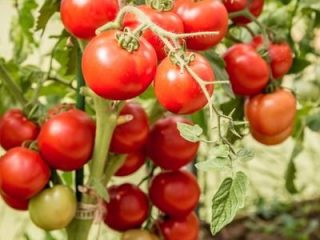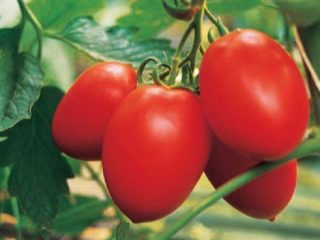Content
When buying tomato seeds, each person studies the characteristics of the variety on the package. Usually, it contains information about the time of sowing seeds and ripening of fruits, a description of the size and color of the tomato itself, and also describes a brief agricultural technology of the crop. In addition, the manufacturer must indicate which plant it is: short or tall. But if the height of a tomato is indicated by such a simple name, everything is clear to any person. But when the inscription indeterminate tomatoes is found, this designation of uninitiated gardeners is misleading.
What are indeterminate varieties
The answer to this question is pretty simple. Indeterminate varieties are the same tall crops. Such tomatoes are characterized by unlimited stem growth, and it does not matter if it is a variety or a hybrid.
In hot countries or heated greenhouses, the growing season of an indeterminate tomato lasts more than a year. During this period, one bush is able to bring up to 50 brushes with tomatoes. All tall tomatoes require bush formation. This process involves removing unnecessary stepsons so that one or two stems are obtained. We will talk about this in more detail later.
Having decided to acquire indeterminate tomatoes, you must first consider the possibilities of growing them. In the southern regions, such a tomato can be planted in open and closed ground. As they grow, the stems are tied to a trellis or wooden stakes driven into the ground. For the middle lane, it is recommended to grow indeterminate varieties in greenhouse conditions. But for residents of the northern regions, it is better to refuse such tomatoes. The peculiarity of these varieties is the late ripening of the crop in relation to other tomatoes. For a short warm summer, the fruits simply do not ripen.
And finally, I must say about the flowering of indeterminate tomatoes. The first flower is laid after 9 or 12 leaves, and all subsequent ones every 3 leaves. This, in principle, is a short answer to the question of what indeterminate tomato varieties are, and then we will try to analyze in more detail all the features of such tomatoes.
The benefits of growing
The main advantage of indeterminate varieties is space saving. On a small garden bed, you can plant a dozen plants and, due to the ovary of a large number of brushes, get several times more tomato harvest than, for example, from 20 undersized bushes. The normal indicator is 13-16 kg of tomatoes from 1 m2 beds.
Another advantage is the availability of creating better growing conditions for tomato.
Of course, here you have to work hard with the garter of the stems. To do this, you will need to build trellises or drive stakes near each bush, but at a height the plant will feel better.
The leaves will receive uniform illumination of the sun's rays, and free air will be provided.All this will reduce the risk of damage to the bushes by late blight and fungal diseases.
You also need to touch on the growing season. Indeterminate varieties bear fruit longer. Low-growing tomatoes most often give the entire crop at once. For sale or processing it is, of course, convenient, but making fresh tomato salads at home throughout the summer will not work. Indeterminate tomatoes most often ripen uncommonly. A new ovary will constantly appear on the bushes until the onset of the first frost, which means that fresh tomatoes will be on the table for the whole summer until late autumn.
And, finally, tall bushes are easier to form even for an inexperienced gardener. All stepchildren are simply removed from the plant, leaving only the stem.
Sowing seeds and growing seedlings
There are no special differences in growing seedlings of indeterminate tomatoes from low-growing varieties, but let's take a look at how this is done at home:
- Growing seedlings of indeterminate tomatoes requires a longer period of about 50 to 65 days. It is necessary to take this into account and sow the seeds a little earlier, somewhere from March 15th. For sowing seeds, boxes with a wet substrate are used. The grains are laid out evenly in rows. This arrangement will provide optimal illumination for the sprouted sprouts. The decomposed seeds are covered with a 5 mm layer of peat or sand on top.
- A box with sown tomato seeds is tightly covered with transparent PET film and placed in a warm place with a constant air temperature of +23aboutC. The first shoots should hatch in 5 or 6 days. Now is the time to remove the film from the box, but it is better to do it in the morning or late afternoon. The choice of this time is due to less moisture evaporation at noon.
- When opened, the seedlings will germinate for at least 6 days. When at least one real leaf grows on the sprouts, they start picking in separate cups.
After picking, cups with seedlings are put into empty boxes for further cultivation.
Influence of temperature conditions
Every vegetable grower wants to get stocky tomato seedlings at home and always with short internodes. The whole secret is to maintain a round-the-clock temperature in the range of 23-24aboutC. After about 25 days, the temperature is reduced by a maximum of 2 degrees. Maintaining this temperature contributes to the formation of the first 3 brushes.
14 days before planting in the ground, the temperature in the room where the seedlings grow is reduced to +19 during the day.aboutC, and at night you can withstand +17aboutC. Here it is important not to overdo it with a decrease in temperature, otherwise it will negatively affect indeterminate tomatoes. The fact is that in the cold the development of the plant is inhibited, and the laying of the first brush will turn out in the wrong place, that is, very low. And as we said above, the first flower in indeterminate tomatoes should be laid at least 9 leaves. Of course, low flower formation will not be detrimental to the plant, but this will lead to a poor tomato harvest in the future.
If the garden is far from home, the seedlings will have to be transported or carried by hand. It should be borne in mind that immature plants react painfully to temperature changes and drafts. It is optimal to hide the seedlings under PET film until they are delivered to the planting site. It is important to stop watering before transporting. Plants that have absorbed moisture become very fragile. By the way, you cannot transfer tomato seedlings lying down.
Now let's see what a healthy indeterminate seedling should look like before planting in the ground:
- A flower brush should form above 9 or 10 leaves.It must be tilted downward, has a short leg and a regular shape.
- The optimal internode length is 5 to 7 cm. All of them must be correctly positioned in accordance with the characteristics of a particular variety.
A powerful stem will tell about strong indeterminate seedlings. It shouldn't be thin, but a stem that is too thick is also bad.
Transplanting
Each plant is carefully removed from the glass along with a lump of soil. Holes are dug in the garden bed so that the native lump of earth from the glass after planting rises above the soil of the garden by about 2 cm.
After planting, the plant must be watered with warm water, but this must be done at the root. Water that gets on young leaves will leave burn marks.
When planting seedlings of indeterminate tomatoes, they adhere to a density of no more than 5 plants / 2 m2... Usually, gardeners plant bushes in rows in 0.5 m increments. The row spacing is left at least 0.7 m in size. For the convenience of tying the whips to the trellis, the bushes are staggered.
Ways to form an indeterminate bush
The formation of a tall tomato is not particularly difficult and involves the simple removal of side shoots. It is customary to form bushes into one or two stems. Let's take a look at all the advantages and disadvantages of each method.
Formation of a bush with one stem
An indeterminate plant is a kind of vine that grows almost indefinitely. The easiest way is to form a bush with one stem. To do this, do not pinch the top of the plant, and remove all the lateral shoots that appear. For gardeners, this procedure is called pinching. Usually in one stem form an indeterminate plants in greenhouse industrial cultivation.
The advantage of this method is in the easy formation of a bush, dense planting and more yield from 1 m2... The disadvantages include the impossibility of such a formation in home greenhouses, since usually their height does not exceed 2.5 m.
There is also a method of forming with one stem. It is based on leaving one shoot under the first flower. The growing stepson is tied to a trellis until 1 or 2 brushes appear on it, and then pinch its top.
The advantage of this method is to get a larger crop from the bush. In addition, the extra ovary slows down the growth of the main stem, which is convenient for low home greenhouses. The only downside is the waste of extra time on the garter and pinching the stepson.
Forming a bush with two stems
The best way to form an indeterminate bush at home is considered to be two stems. To do this, one shoot is left under the first flower, which will constantly grow in parallel with the stem. All new stepchildren that appear are removed.
The plus of such a formation is all the same getting a larger yield and limiting the intensity of growth of the entire plant. The disadvantages include an increase in the step of planting seedlings. With the formation of a larger amount of ovary, the plant requires additional fertilizing with fertilizers.
The video shows the care of tall varieties:
Garter rules
The optimal structure for tying indeterminate tomatoes is considered to be a trellis. It is made of metal racks with a height of at least 2 m, between which a rope or wire is stretched. The tomato stalk begins to be tied under the third leaf.
It is convenient to use spools in the trellis design, with the help of which the ropes are fixed. This allows the threads to move along the trellis. When the bush stretches to the upper jumper, using the same coil, the top of the stem is shifted to the side. Further, the growing stem is directed to a net or other props, and the lower leaves are removed.
In the absence of coils, the grown stem is thrown over the upper jumper of the trellis, and at an angle of 45about lower it down with a gradual garter. In this case, the bush should form at least 9 brushes.When the stem of the tomato drops to a maximum of 0.5 m to the ground, pinch its top.
What are the signs to distinguish indeterminate varieties from determinant ones
It must be said right away that all undersized varieties are called determinant tomatoes. But we will not consider them, but we will learn how to determine the difference between these two species starting from the earliest period of life.
Difference by seedling
On the third or fourth day after the sprouts appear, the cotyledonous knee is extended. In low-growing tomatoes, its maximum length is 3 cm, and in indeterminate varieties - 5 cm.But if the seedlings are grown incorrectly, shaded, it stretches, and determination in this way becomes impossible.
Difference by seedlings
Adult seedlings determinant tomatoes forms a flower raceme over 6 leaves. Seedlings of indeterminate varieties throw the first flower over 9 leaves.
Difference by rooted plant
When a bush is rooted and already has several brushes, it is difficult to determine its belonging to one of the groups.
An adult indeterminate plant does not have a shoot, at the end of which there is an ovary, which is inherent in low-growing varieties. Although here you can make a mistake if, when forming a tall bush, the stepson pinched right behind the brush. Therefore, it is better to determine by the number of sheets.
High-growing varieties of tomatoes related to determinant group... Less than three leaves grow between their brushes. There are even indeterminate varieties related to standard crops. A vivid example of this is the late tomato "Volgogradskiy 5/95".
For the record, it must be said that the height of the standard plant is much less than that of the determinant one. Its stem is so strong that it can withstand any number of fruits without a garter. By the way, standard tomatoes do not stepchild.
The video shows indeterminate and determinant varieties:
Conclusion
We hope that novice vegetable growers figured out the basic definitions of indeterminate tomato varieties, and now, when studying the characteristics on the package, there will be no unnecessary questions.
